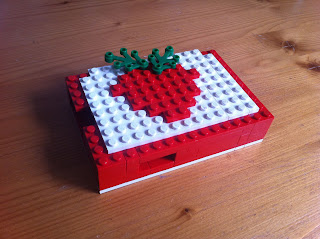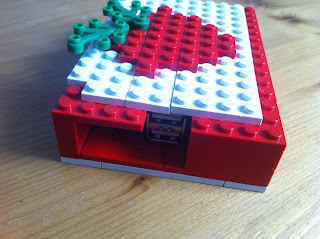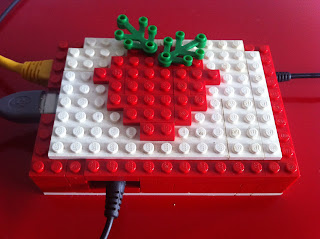Raspberry Pi
category: code [glöplog]
Anyone interested in microcontroller tinkering and craving to have more processing power, cheap bgn-WiFi and Linux should look into this one: http://shop.8devices.com/carambola
320MHz, 32MB RAM, 8MB Flash, WiFi, LAN, SPI, I2C, UART, running on OpenWRT => 22€!!!
Dump all your shabby Arduinos. This is the real thing ;)
320MHz, 32MB RAM, 8MB Flash, WiFi, LAN, SPI, I2C, UART, running on OpenWRT => 22€!!!
Dump all your shabby Arduinos. This is the real thing ;)
Clickable for the lazy ones: [url=http://shop.8devices.com/carambola]http://shop.8devices.com/carambola[/ulr]
Meh.
i'm in the queue for the next batch. must be the cheapest media centre i ordered so far.
Quote:
Meh.
No shader coding on that one, sorry... ;)
carambola having more processing power than the pi? i seriously doubt that.
as in: "more than your ordinary microcontroller" (aka Arduinos, AVRs, PICs).
I would love to have the skill and free time to make one of these:
http://revision3.com/tbhs/retro-computer
I have 10 weeks to wait so maybe I can :)
http://revision3.com/tbhs/retro-computer
I have 10 weeks to wait so maybe I can :)
I accidentally opened the GL context behind the console (where it used to be black). Useless, but it's pretty to have a spinning cube to look at when you work with the console... If I load a 3D model of the raspberry logo: instant fame.
phat specs indeed
raer: android, meh
Then download and copy an Ubuntu 12.04 ARM port to an SD card and off you go...
this might be a better choice in the end. At least you get a decent gpu and driver. :) I received my rpi but i can't wait for the new raspbian that comes with hardware fp32 support... ;]
What distros are you using?
I'm getting confused with all the different distros and hard float and non hardfloat... There isn't a clear official experimental distro where most of the progress appears, apparently it's debian, but debian for ARM only has support for software floating point, while for raspberry pi it should have real floating point support. Instead they're endorsing a bunch of distros without a clear lead distro... Meh. Linux.
I'm getting confused with all the different distros and hard float and non hardfloat... There isn't a clear official experimental distro where most of the progress appears, apparently it's debian, but debian for ARM only has support for software floating point, while for raspberry pi it should have real floating point support. Instead they're endorsing a bunch of distros without a clear lead distro... Meh. Linux.
...all that isn't really relevant to having an OpenGL context and continue porting stuff, but it's not so good for other uses.
I refuse to use a PI until someone ports AmigaDOS.
xernobyl, ARM hard-float vs. "non-hard float" doesn't mean the FPU isn't used at all for the latter -- it's just the function calling convention. softfp distros (like the current Debian) can still use the FPU just fine, they'll just pass floating-point args in integer registers. As long as you're not calling functions with FP arguments in inner loops, it probably won't make a huge amount of difference to performance.
In any case, seems like most of the power of the r-pi is hidden in the videocore, so the ABI on the ARM side won't make a whole lot of difference.
In any case, seems like most of the power of the r-pi is hidden in the videocore, so the ABI on the ARM side won't make a whole lot of difference.
...& nystep, that looks nice, but I wouldn't buy another tegra device after the ac100 -- which was completely & utterly ruined (for proper-Linux use) by shabby/nonexistent drivers. Shame!
Quote:
As long as you're not calling functions with FP arguments in inner loops, it probably won't make a huge amount of difference to performance.
Ah. :) I think i understand a little better now, my mistake. :)
Looking through the default Lenny image you can find example code using the hardware in /opt/vc/src/hello_pi/hello_*
There is hello_triangle to get an OpenGL context _without_ fucking around with X and SDL, which accesses the hardware directly (at least as directly as one gets through userspace).
GCC is provided in said image, therefore make && ./hello_triangle for results.
More close to the metal code (again only in linux userspace) is at: https://github.com/raspberrypi/firmware
There is hello_triangle to get an OpenGL context _without_ fucking around with X and SDL, which accesses the hardware directly (at least as directly as one gets through userspace).
GCC is provided in said image, therefore make && ./hello_triangle for results.
More close to the metal code (again only in linux userspace) is at: https://github.com/raspberrypi/firmware
What nystep said.
Even thoug it should be quite portable, I thought I'd let you know that we will have at least one Raspberry Pi at Evoke...so you just need to carry your SD-Card :)



